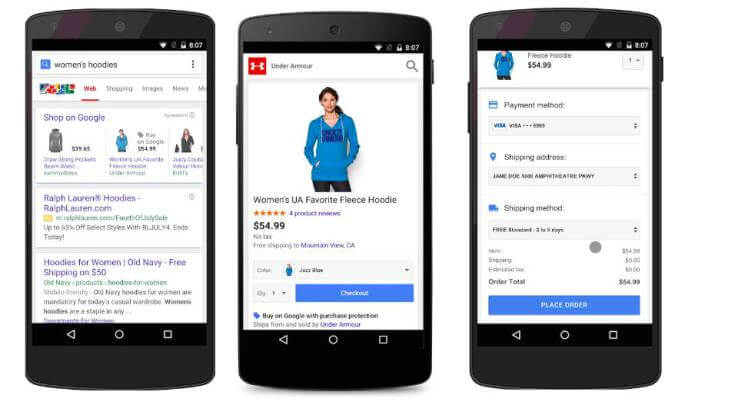The Shifts In Consumer Behavior Driving Google’s Maturation
Columnist Nathan Safran takes a look at where Google is heading -- and what challenges it faces -- in the age of mobile.
While at Google’s offices recently, I had the pleasure to hear a Google Product Manager present the company’s view of how information retrieval has changed with the rise of mobile and smartphone adoption.
They are calling it “micro-moments,” the premise being that as smartphone adoption and use continues to skyrocket, consumers increasingly have small bursts of interaction with their phones across search, social, video and email, as opposed to prolonged periods in front of a desktop.
This viewpoint represents a shift from the linear “sit, search and act” desktop mentality that characterized the early days of the internet, in which research and action were typically performed in one sitting while in front of a connected internet device.
These days, according to Google, more searches are done on mobile than on desktop in many countries, including the United States, Japan and United Kingdom.
Google’s micro-moment perspective posits that discovery and action are decoupled as discovery comes in multi-session bursts, across channels, on a mobile device, while action (conversion/purchase) often takes place later on a larger screen, a laptop or tablet device.
Implications For Google
While I like Google’s presentation of the micro-moments paradigm and agree with the premise, the shift to snackable moments on mobile has real potential implications for the mighty Google and their business model.
First, it is much harder to sell ads against mobile search given the reduced real estate available on a smaller screen and users’ low tolerance for shenanigans. (The reduced real estate simply translates to a lower volume of ads they can show per search.)
Second, while Google understandably emphasizes mobile search in their micro-moments materials, a core premise of the shift to mobile snackable moments is that it happens across channels. I see a shirt I like that my friend is wearing on Instagram and ask him about it. I follow Nike’s Facebook page to find out when their new shoe is coming out. I get a notification on Twitter that the restaurant I was waiting to open is finally taking reservations. On mobile, Google does not retain the discovery domination it once enjoyed on the desktop.
Discovery Diversification
At this point, it bears mentioning that I do not buy into the hype that we sometimes hear in the industry predicting Google’s imminent decline because of the rise of social or the move to mobile (or any other reason, for that matter).
More than three billion searches take place globally every day, and that number only seems to be growing. The fact is, search is still the most useful way to obtain information, and it will not be replaced any time soon.
Nevertheless, if I’m sitting at the head of the executive conference table at Google, the trend of consumer discovery diversifying across channels in micro-moments on mobile commands my attention.
If I am adhering to the first rule of investing that calls for diversification of one’s portfolio, I am asking how we are adapting to changing consumer behaviors and how we are diversifying beyond ad search revenue (Google’s failed attempts at social notwithstanding).
Some at the table will surely argue that search is complementary to these channels — I see a friend’s shirt, ask him about it, and then search for the brand on Google. While this may be true to some degree, as a conscientious executive I remain concerned that it’s now too easy for consumers to cut out the middleman and go directly to the source.
Clues About Google’s Thinking
Clues about Google’s long-term thinking on these issues may lie in some of the most recent updates to their search engine. Search Engine Land recently reported that Google is testing new ads that allow users to book a home professional from the search results.
Only a few weeks ago they announced “Purchases on Google,” a new feature that allows consumers to buy products directly from mobile search ads. (Notice the emphasis on mobile.)
They’ve also experimented with booking travel directly from the search results.
Could Google’s diversification/shift to mobile mean it’s going to become the world’s biggest affiliate marketer? Is it enough? How does Google contend with the ongoing diversification of consumer discovery?
As I mentioned, I don’t think the core search experience is going anywhere any time soon. But even with all the exciting things happening on mobile — from social to apps to voice assistants — we are still in the early days of what’s to come. The more time goes on, the greater the pool of discovery options for consumers on mobile, and the more concerned Google should be that discovery diversifies away from search.
The fact is, as dominant as they have historically been in their chief domain of search, they face an uphill battle in diversifying away from it, and although I am rooting for them, it’s not clear that what they have experimented with thus far will be enough as mobile continues to evolve as a platform and consumer behavior continues to shift.
What’s your take on Google’s long-term discovery diversification plan?
Contributing authors are invited to create content for Search Engine Land and are chosen for their expertise and contribution to the search community. Our contributors work under the oversight of the editorial staff and contributions are checked for quality and relevance to our readers. The opinions they express are their own.
Related stories
New on Search Engine Land


